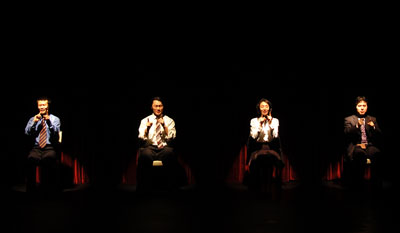
"Spectator Debasement" criticizes a former play directly or indirectly. That is to say, there are only words without a story, stage setting and stage property. This is an exceptional play, awaking from a fixed idealess perfectly about a former play. Actors warn the audience at first not to expect a dramatic plot. Spectators are confused, as they try out like that play of language for the first time and complain about this at a seat for a guest. In particular, dialogues through disturbance of spacing words or copying a minister's, football player's, seller's way of talking arouses laughter of unusual nuance, as it differs from a general play. Players are consistent in a half-dramatic manner, spreading a theory in their own way about a play, time and audience continuously.
This work is an introduction about a kind of behavior by the audience. They want to say that a seat is in an equal realm as the stage, as a spectator relates to the stage in person. It is easy to know, out of consideration that it is advanced, speaking to the audience directly from first to end, that seats are as bright as the stage, compared to former plays where spectators quietly look up actors just sitting still. There are two plays – guests only watch or are included inside. The conclusion of the included play is decided by the spectator's opinion. Namely, whenever they perform, they play a drama creating a different story. Though they didn't practice together, they are in harmony. One-way at the former play has commented. This work attempted to use a feedback between actors and the audience by making it better.
In order to approach them more familiarly, this work represents contents that words or sentences hold, as to use the natural forms of expression used in daily life. It satirizes society indirectly by using this way. It gives us lessons as well as interest. While we view the performance for about 2 hours, we laugh at gestures and words, but we also have a chance to think again about society and the world.
Also, the emphasis in this work for the writer is a new idea about space and the time. Seats and stage emerge from the concept of room, stage, locked in a play as a unified organization. This production lets spectators recognize that time is unique and is a meaning of life through this play. According to this intention, this work pursues a purity of amusement through language and action. It uses a stage as a space for the play and stands as the basis for the play of experiences related to language and motions.
Ki Guk-seo, the producer, said, "It seems that this work makes an attack for play on words in the surface which ignores systems such as conventional expression and spacing words. However, it criticizes us in living peacefully in activity without consciousness for problems. "Following on slander and ridicule, irritating self-awareness of spectators takes down the wall between the stage and the audience. It becomes a way of access 'opening men', joining space and time. In the last section, abuse exposure the world at large and hidden desire and false awareness cruelly gives us a shock and arouse a catharsis. It is swearwords not to be used on formal occasions, but allowed only here. Spectators shout td the for world, to themselves, hearing abusive language. It is an opportunity to reflect. That is the reason for going out with delight, though they are exposed to water.
By Ko Hyun-sun
Culture reporter
HERALD
webmaster@herald.cau.ac.kr

